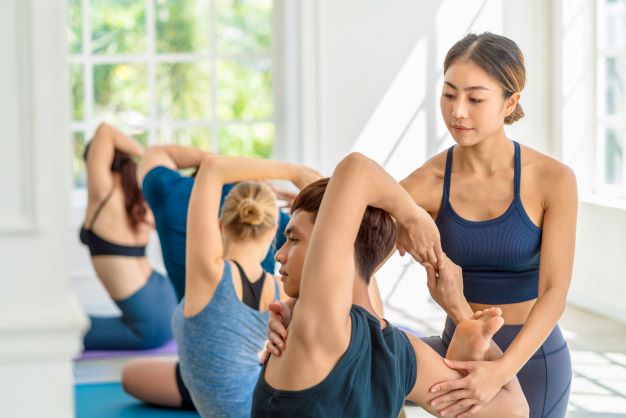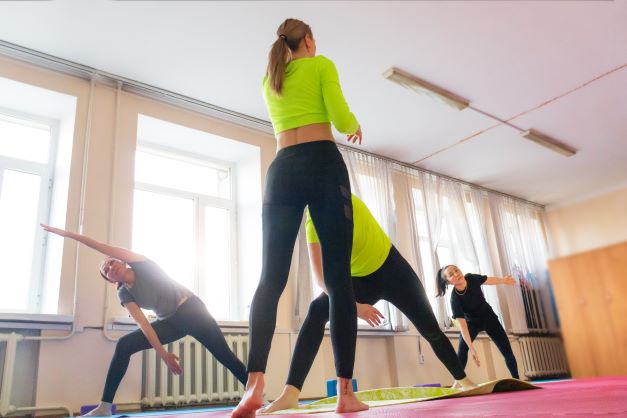Skills You Need to Be a Yoga Teacher

Yoga teachers should be approachable and engaging to build relationships with their students. It is also important that they are professional at all times.
It is also vital that yoga teachers remain up-to-date with their skills. This can be done via continuing education, workshops or re-training courses.
Physical Fitness
The ability to be physically fit is one of the most important skills a yoga teacher can have. It is important for the physical well-being of their students.
A yoga instructor needs to be able to help their students increase their cardiovascular fitness, muscle strength and flexibility. You can do this by teaching them different styles of yoga.
Besides helping students improve their overall physical fitness, yoga can be beneficial for their mental health as well. Yoga isn’t competitive and focuses on meeting students where they are without judgement or expectation.
Being a yoga teacher has many benefits. You can work with a diverse group of people from all walks of life and help them find their inner peace.
Many yoga teachers are also able to travel around the world teaching their students. This can be an excellent way to meet new people and build a network of yoga friends.
Before a yoga instructor can begin their training program, it is important to be in good physical condition. Because most programs require them train for three hours per day for six consecutive days, this is important.
In addition, a yoga instructor needs to be able to manage their time effectively. They will likely have many reading assignments and personal commitments as they prepare for training.
It is important to be prepared for injuries and illnesses. This is especially true if you are traveling to a country away from your home and where medication may not be as readily available.
Communication Skills
A yoga teacher’s communication skills are essential for communicating with students during classes. These skills enable the teacher to give students information about yoga history and principles. They will also show students how to do a particular yoga technique correctly.
A yoga teacher must also be able to communicate with other teachers and instructors in their local area. This will help teachers communicate with other teachers about class scheduling and other issues that might arise during a session.
Effective communication skills are necessary for a yoga instructor because they need to be able to speak clearly and concisely in a class setting. This is especially important because yoga classes can be fast-paced and loud. The teacher needs to be able to speak clearly so that everyone in the room can hear them.
Effective communication also includes the ability to listen to and adapt to each student’s needs. A teacher should be able and willing to help a student with a knee injury or any other health problem before they start class.
It is important that a yoga teacher can listen to students’ concerns and questions. This will help students feel confident and comfortable in their practice.
Yoga is an individual practice. Each person will learn it in their own way. As a result, not every yoga teacher will be able to teach the same poses. A yoga teacher must be able adapt their teaching style to meet the needs of each student. This is often done using different verbal and/or nonverbal methods to communicate their instructions.

Patience
One of the most important skills for a yoga teacher to have is patience. Patience is a quality that allows you to remain calm, collected, and resilient in difficult situations. It also encourages you to think about the long-term benefits of your actions.
Although patience isn’t something most people have, it is something you can learn. Meditation, breathing techniques, as well as other stress-relieving activities, can help you be more patient with yourself. By showing kindness and compassion, you can also learn to be patient with other people.
Teaching patience to your students is an important part of being a yoga teacher. Your students will be more patient in everyday life if they show patience.
Learning to be patient isn’t easy for children, but it can be taught. You can help your child learn patience by finding activities that are enjoyable but don’t give you instant gratification.
For example, if your children are young and don’t know how to time things, you could ask them to wait for a set amount of time before they get something. This could take a few seconds or a longer time.
This will help them to understand that they must wait before they can get what they want. It’s also an excellent way to teach them patience and not get frustrated.
You can also practice patience with students by being understanding when they make mistakes. This will help them to see that they are not alone and can learn from their mistakes. You and your students will be able to build stronger relationships. They will feel valued and heard.
Creativity
For a yoga teacher, creativity is a key skill. It can help you come up with new ideas for classes, and can also inspire you to develop creative ways to connect with your students.
Many yoga teachers are also artists, and they use their creative pursuits to enhance their teaching. They can draw inspiration from the way the poses are shaped, or the deep experiences they have on the mat.
Yoga can help you express your creativity, whether you are a writer, painter or musician. Yoga can lengthen a narrow spine, open tight hips, improve flexibility, and increase your stamina.
Yoga can have many benefits, not only for your physical health but also for your mental well-being. It may reduce stress and anxiety, increase your sense of well-being, and promote healthy sleep.
Meditation is another tool to help you be more creative. It promotes mindfulness, which is a key skill for creatives because it allows you to become aware of your thoughts and emotions without judgment.
You can practice mindfulness exercises during your yoga practice. Hand breath, for example, can help calm your heart rate, and quiet your mind.
As a yoga teacher, you might also use creativity in your classes by weaving themes into the sequences you teach. This is a great way to bring depth and meaning to your class and encourage more participation from your students.
It can be difficult to find creativity out of thin air. However, taking a step back and allowing your ideas flow can help you get started. Relaxing in a child’s position or meditation can help you relax and focus on your breathing. This will allow ideas to flow from your head to the fingers.
Leadership
Leadership is a skill that yoga teachers can develop to improve their careers. This includes being compassionate, setting boundaries and empowering others. A leader who has these qualities can influence their community and the world at large.
Leadership also requires you to be able to set high expectations for yourself and your students. This is important as it will help you build a positive reputation, and encourage people to stay with your program. When it comes to the types of classes you offer, you should be realistic and give options.
Another way to practice leadership is by encouraging your students to “Be on the edge.” This means you should be willing to take risks, including pushing yourself beyond your comfort zone. You’ll be more flexible in your career if you do.
Moreover, yoga teachers should be able to show their students how the practice can change their lives. They can explain how it can help them feel calm and peaceful, which can help them achieve their goals.
A good leader is also patient and understanding. This will help them guide their students through difficult situations. They should be able to keep their personal lives separate from the class to make it easier to provide authentic experiences for their students.
Being yoga teachers and wellness entrepreneurs has an advantage in being leaders. They are already naturally highly emotional intelligent. This can allow them to communicate more effectively with their students and clients, which can result in greater confidence in their leadership abilities.




